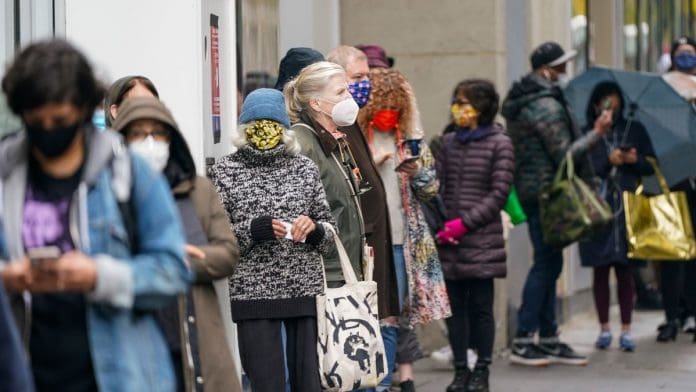Frightening state-specific Covid stories:
Political timeline — Reminder: President Donald Trump will be in office for more than two months after Election Day so, regardless of what voters choose, there’s unlikely to be forceful Covid leadership at the national level during this fall surge.
So will it be a mandate for masks or a mandate against requiring them? We’ll see.
Mitch McConnell is sounding resigned to a loss
Senate Majority Leader Mitch McConnell has spent the better part of the last few years either blocking Barack Obama’s judicial nominees or jamming Donald Trump’s through.
He seems to understand that Senate majorities and presidencies are subject to the fickle whims of those frustrating voters, while the federal judiciary, and in particular the Supreme Court, jobs last a lifetime.
The quote: “We’ve made an important contribution to the future of this country,” McConnell told his colleagues. “A lot of what we’ve done over the last four years will be undone, sooner or later, by the next election. Won’t be able to do much about this, for a long time to come.”
What “next election” probably means to McConnell: He probably meant to be oblique, referring to the next election (and a change in power?) as something that will either happen now or later.
What “next election” actually sounds like: But the way he phrased it sure made it sound like he’s not very optimistic about retaining at least some Republican foothold on power come January.
What will be undone? Separately, he talks as if there’s been a massive number of GOP accomplishments. The biggest, by far, piece of legislation he could be referring to is the GOP tax cut bill. Democrats will have their eye on undoing some of those tax cuts, which Republicans enacted without any eye to balancing the budget. Democrats will try to use the proceeds to enact new programs. But I digress.
A reference to current events: The other interesting element here is that he’s arguing Democrats won’t be able to change the GOP-nominated majority (now 6-3!) on the court for a long time to come.
McConnell is a man who pays attention, so there’s zero chance he’s not read in on this idea that Democrats could move to change the size of the Supreme Court and dilute the GOP-nominated majority, something Republicans are banking on motivating their voters in the future.
My interpretation of McConnell’s line here is: Bring it.
But again, McConnell seems to be eying the next election as much as this one.
A win. But for what? The last thing I’ll point out is the extreme tribalism of McConnell’s comment. The court should not, in his view, represent the values of a changing country. It should represent the conservative values McConnell likes — the longer the better. In the us vs. them game in his head, he just won big, regardless of what happens to his majority next week.
We’re learning more about who is voting
An election of margins — Even small-seeming shifts are going to be extremely important when the country is this split and the coronavirus has voters on edge. Faith Karimi talked to Black voters in Georgia and around the country about why they appear to be turning out in stronger numbers than four years ago. Read her report.
The impact of crises on election results – Historically, this is not the first presidential race to occur to the backdrop of complex global events. While a cause-effect relationship has always been noticeable between US politics and the world, from throwaway tweets from Trump affecting the stock market to embargoes on trade having world-wide impacts, the responses of both parties to Covid-19 will majorly influence this election, if not the world’s attitude to confronting the pandemic.
Democrats’ early vote advantage narrows — CNN’s Marshall Cohen has looked at data from Catalist over the past week and found the edge for registered Democrats in early voting has narrowed. Note: There’s no guarantee a registered Democrat or Republican voted for Trump or Biden, so this is not hard stuff.
What’s the data? Over the past week, the Democratic advantage has dropped by 13 points in Nevada, 12 points in Florida, 11 points in North Carolina, 7 points in Colorado and 5 points in Pennsylvania, according to voting data from Catalist. Democrats also saw smaller drops in Arizona and Iowa.
A smaller lead is still a lead. Democrats are still ahead in those states. In Nevada, about 44% of all votes cast so far are from registered Democrats, and only 33% from Republicans. The gap is even more substantial in Pennsylvania, where Democrats currently make up about 70% of all ballots already cast.
What’s it mean for the campaigns? Democratic leads mean Biden’s campaign can fine-tune its mobilization operation and focus on voters that haven’t cast ballots yet. Trump’s campaign will therefore face a heavier lift next week to get behemoth turnout on Election Day, experts say, and there could be other variables at play, like bad weather or long lines that discourage voting.
Will this year break turnout records? There are, even in high turnout years, a shocking number of eligible Americans who don’t vote.
The high water marks (1964 >63% and 1908 > 65%) are still well below 70% participation.
There’s a lot to suggest this year’s turnout will eclipse the 60.1% we saw in 2016.
Can your ballot be cured? Do you know?
Ballots facing rejection — CNN’s Curt Devine reports: Thousands of mail-in ballots in Florida could be thrown out due to missing or mismatched signatures, and ballots from Black and Hispanic voters make up a disproportionate level of those affected, according to data obtained and analyzed by Daniel A. Smith, a political science professor at the University of Florida.
As of Sunday, 14,863 vote-by-mail ballots had been flagged for rejection in Florida — nearly .5% of all mail-in-ballots cast in Florida so far, Smith told CNN.
Reminder: 112,911 votes, or about 1.2%, separated Hillary Clinton and Donald Trump in Florida in 2016.
Floridians have until two days after the election to “cure” those issues by correcting mismatched or missing signatures.
Disparity in ballot rejection — Black and Hispanic voters have had .7% of their returned mail-in ballots flagged, compared to .3% from white voters, according to Smith.
Young voters are even more disproportionately affected — 18- to 23-year-olds have had 1.2% of their mail-in ballots marked for potential rejection.
“Most represent ballots cast by eligible voters—voters who would very likely have their ballots count had they voted in person—that are rejected for a technical issue,” Smith said.
Few cures so far — Orange County, Florida, Supervisor of Elections Bill Cowles told CNN on Friday that only 357 ballots out of 1,685 ballots that have faced rejection in his county for signature issues have been cured. He said if ballots have signature errors, his office “immediately” reaches out to the voters who cast them based on the contact information they provided, so he doesn’t understand why some voters don’t promptly cure their ballots.
“They are getting multiple contacts from this office encouraging them to do it.”
Benefits outweigh risks — Mark Earley, supervisor of elections for Leon County, Florida — which includes Tallahassee — said that although he recognizes the number of rejections statewide can potentially be significant, he believes the benefits of mail-in ballots vastly outweigh the risks of signature-related rejections.
Earley said vote-by-mail “helps the turnout much more than it potentially disenfranchises.” “I’m really tired of people saying this is a big threat to vote-by-mail… The fractions are so minute,” Earley added.
“More people probably get a flat tire driving to the polls.”
Barrett takes the bench
There’s officially (or about to be, depending on when you read this) a new Supreme Court Justice, Amy Coney Barrett.
She’ll be sworn in Monday night by Justice Clarence Thomas and apparently be feted at the White House, despite the odd optics of soon potentially taking up election-related cases and the odd history of the fact that the White House even announcing her nomination was a Covid super-spreader moment.
Vice President Mike Pence had to skip her confirmation vote due to the Covid outbreak in his office.
Trump taxes case: The justices are primed to decide soon whether a New York prosecutor will get access to Trump’s financial documents from January 2011 to August 2019, including his tax returns.
Pennsylvania ballot extensions: Republicans in Pennsylvania asked the Supreme Court on Friday to block a ballot receipt extension that would allow them to be counted if they are received within three days of Election Day — even if they do not have a legible postmark.
Minnesota congressional election date: A Republican candidate for Minnesota’s 2nd Congressional District is asking the justices to intervene in a case concerning whether his election takes place on November. 3 or on February 9, after the recent death of Legal Marijuana Now Party candidate Adam Weeks caused the contest to be moved to next year as required by state law.
Mississippi abortion case: As abortion rights backers and opponents spar over whether Barrett’s confirmation would mean the end of Roe v. Wade, the 1973 landmark Supreme Court decision, the justices will consider Friday whether to hear a case that could directly consider the precedent. The case pertains to Mississippi’s 15-week abortion ban, which Republican Gov. Phil Bryant signed into law in 2018. The law made exceptions only for medical emergencies or cases in which there’s a “severe fetal abnormality,” but not for incidents of rape or incest. A federal judge in Mississippi struck down the law in November 2018, and the 5th US Circuit Court of Appeals upheld the ruling late last year.
When Republicans DO want to expand courts
Republicans have attacked Democratic calls to expand the size of the Supreme Court as court “packing.”
But they’ve embraced it in a number of states to suit their political needs.
Dates
Tuesday – Connecticut
Thursday – Nevada, although both states have Election Day registration
Deadlines to request mail-in ballots
Tuesday – AR, CA, HI, KS, KY, NY (postmark deadline), NC, OK, PA, TN
Wednesday — MA, WA, WV
Thursday — AL, IL (request by mail), ME, OR, WI (request by mail)
But I’d be extremely nervous about starting the mail-in process at this point. Check out early voting and Election Day options too.
Early voting start dates:
Tuesday — DC and some Kansas counties
Thursday — Oklahoma






